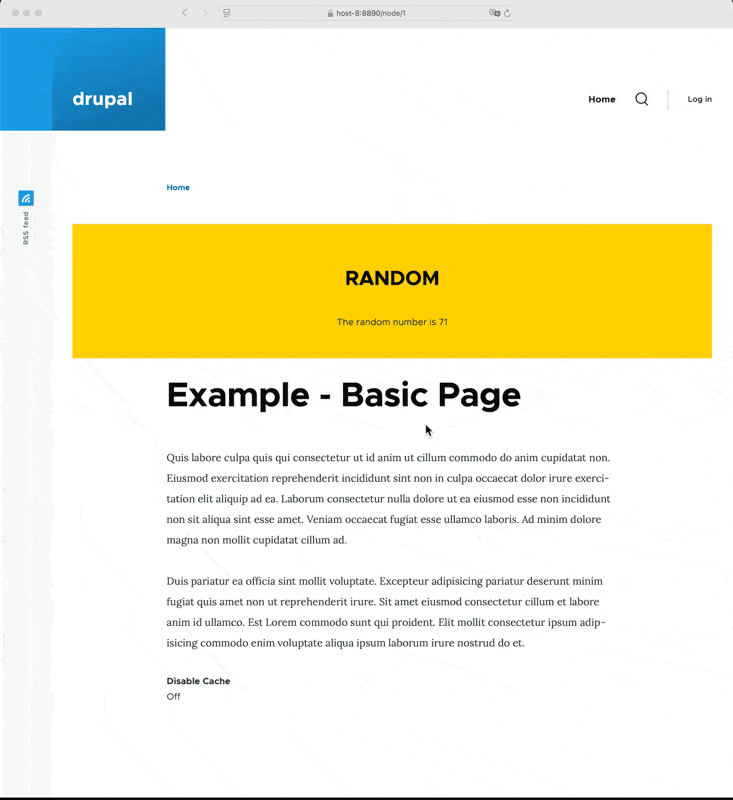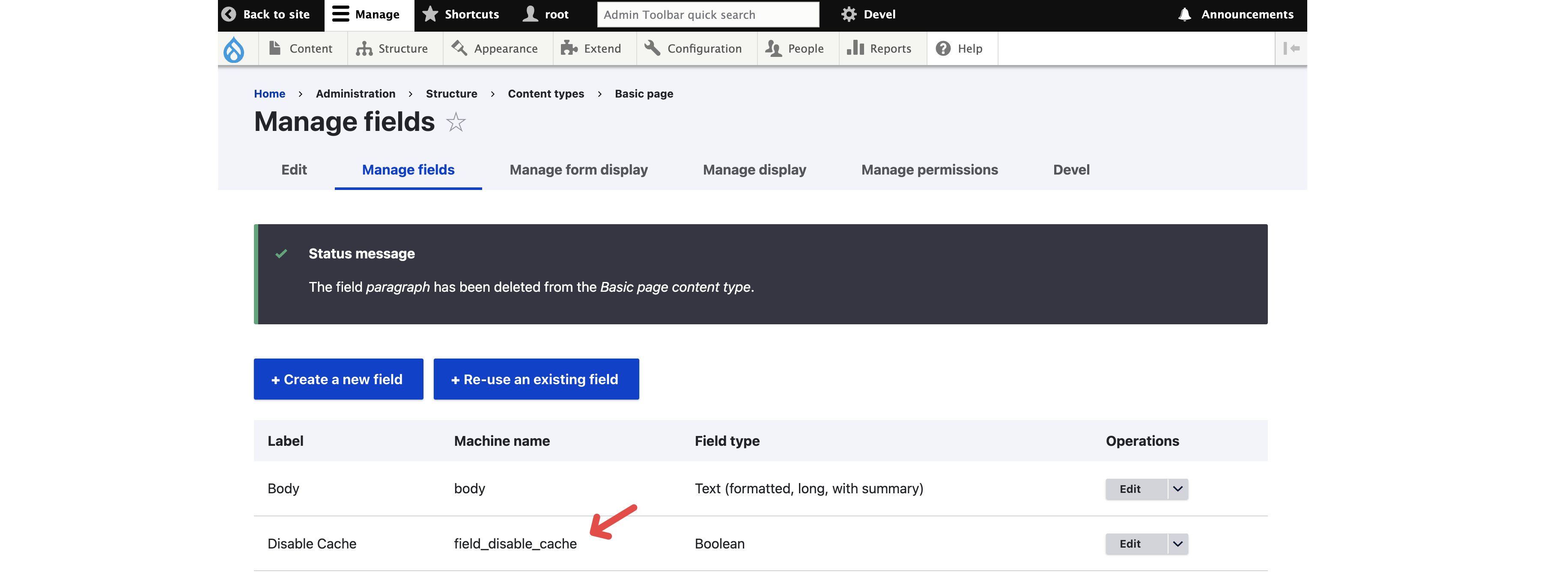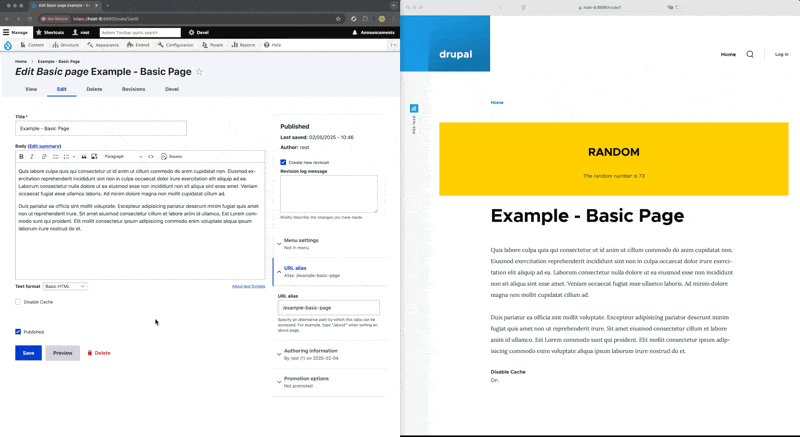Intuition#
I was working with a GovCMS SaaS environment where I have no control over the core code or modules, in another word, the only thing I can play around with is the custome theme. And the client requested for an cache invalidation mechnism, that they want remove the cachability feature from a portion of the website, as the follows:
- Content Type: for instance content type of machine name
article_noCache, will not retain cache - Node ID / Url: certain node of ID (e.g.
node=1), or certain url (e.g. http://<root-url>/example-standarg-page , will not retain cache - Field Value: disable cache for node if they have certain field equaling to a pre-defined value (e.g. boolean field
field_toggle_cacheDisable == 1, so they can turn on/off cache for pages on the admin backend)
Disclaimer (& Confession)#
During the time writting this post, I do not actually fully understand how the caching in drupal works, all I understand is there’s a drupal-side caching for render-array, and caching on the browser-side; And setting http-header to disable cache (i.e. Cache-Control: max-age=0, no-cache, must-revalidate) only disbale the browser-side caching; The drupal-side render-array-cache expiry is controlled by: cache tags, cache context. If a browser keep any of the two caching mentioned, it may potentially hold a historical/outdated version of the page.
Of course I’ll revisit this “Drupal Cache” topic when I get the chance to, but for now I am only sharing my pre-mature limited thoughts, and solution of what worked for me. If you are into this topic, please kindly refer to the reference section of the post for more materials.
Development Step Reproduced#
Step-0: Simulate Cached-Page Situation#
First of all, since updating a node will trigger the cache invalidation via the cache tag:
Tagged cache items are invalidated via their tags, using cache_tags.invalidator:invalidateTags() (or, when you cannot inject the cache_tags.invalidator service: Cache::invalidateTags()), which accepts a set of cache tags (string[]).
– Read more: https://www.drupal.org/docs/drupal-apis/cache-api/cache-tags
Let’s simulate the cached-page situation by overriding page.html to add a random number section:
1
2
3
4
5
6
7
8
9
10
11
12
13
14
15
16
17
18
19
20
21
| <html>
...
...
{% else %}
<main role="main">
<!-- ████████████████████████████████████████████████████████████████████████████████████████████████████████████████████████████████████████████████ -->
<!-- Since this item does not have cache-tags/context set, it will be cached indefnitely until the invalidation of the page, or website cache rebuild -->
<div
style="border: 3px solid #ffcf00; background-color: #ffcf00; padding: 30px; margin-bottom: 10px; text-align: center; margin-bottom: 30px">
<h2> RANDOM </h2>
<p> The random number is {{ random(0, 100) }} </p>
</div>
<!-- ████████████████████████████████████████████████████████████████████████████████████████████████████████████████████████████████████████████████ -->
{{ page.content_above }}
{{ page.content }}
</main>
{% endif %}
{{ page.content_below }}
...
...
</html>
|
of which has no cache-tag and cache-context, hence will be cached indefnitely.

Step-1: Custom Theme Hook#
Since we only have the ability to play with custom theme, that means we can only play around with the theme hooks to manipulate the render hook, here for showcasing purpose let’s use theme hook theme_page_attachments_alter, simply chuck the below code in your customThemeName.theme file; For our instance we are using the olivero theme, we need to add the following into olivero.theme:
1
2
3
4
5
6
| function olivero_page_attachments_alter(&$attachments){
disable_renderCacheFor_nodeOfID(1, $attachments); // Disable Cache for node with ID 1
disable_renderCacheFor_url('/example-basic-page', $attachments); // Disable Cache for url of "<root-url>/node/1"
disable_renderCacheFor_contenType('page', $attachments); // Disable Cache for all page of content type page (Standard Page)
disable_renderCacheFor_fieldEquals('field_disable_cache', '1', $attachments); // Disable Cache for all node with field_disable_cache = 1
}
|
Step-2: Conditional to Determine when to Invalidate#
Next we’ll define the functions used above that determines when to invalidate the scache for pages (also in oliver.theme):
1
2
3
4
5
6
7
8
9
| function disable_renderCacheFor_nodeOfID($nodeId, &$attachments){
// Get current node
$node = \Drupal::routeMatch()->getParameter('node');
// Target specific node ID
if ($node && $node instanceof \Drupal\node\NodeInterface && $node->id() == $nodeId) {
disable_browserCache_attachments($attachments);
disable_renderCacheFor_attachments($attachments);
}
}
|
1
2
3
4
5
6
7
8
9
10
| function disable_renderCacheFor_url($url, &$attachments){
// Get current path (and alias)
$current_path = \Drupal::service('path.current')->getPath();
$internal_path = \Drupal::service('path_alias.manager')->getAliasByPath($current_path);
// Disable cache for current path or its alias
if ($current_path==$url || $internal_path == $url) {
disable_browserCache_attachments($attachments);
disable_renderCacheFor_attachments($attachments);
}
}
|
1
2
3
4
5
6
7
8
9
| function disable_renderCacheFor_contenType($contenType, &$attachments){
// Get current node
$node = \Drupal::routeMatch()->getParameter('node');
// Disable cache for current node if its content type matches the target
if ($node && $node instanceof \Drupal\node\NodeInterface && $node->getType() === $contenType) {
disable_browserCache_attachments($attachments);
disable_renderCacheFor_attachments($attachments);
}
}
|
1
2
3
4
5
6
7
8
9
| function disable_renderCacheFor_fieldEquals($fieldName, $fieldValue, &$attachments){
// Get current node
$node = \Drupal::routeMatch()->getParameter('node');
// Disable cache for current node if its field matches the target
if ($node && $node instanceof \Drupal\node\NodeInterface && $node->hasField($fieldName) && $node->get($fieldName)->value == $fieldValue) {
disable_browserCache_attachments($attachments);
disable_renderCacheFor_attachments($attachments);
}
}
|
Step-3: Logic to Disable Cache#
Lastly, we need to implment the two logic function that disables the caching: disable_browserCache_attachments and disable_renderCacheFor_attachments
1
2
3
4
5
6
7
8
9
10
11
12
13
| function disable_browserCache_attachments(&$attachments){
// 1. Disable render cache
$attachments['#cache']['max-age'] = 0;
// 2. Set HTTP headers
$attachments['#attached']['http_header'][] = ['Cache-Control','no-store, no-cache, must-revalidate, post-check=0, pre-check=0, max-age=0'];
// 3. Add HTML meta tags for extra prevention
$attachments['#attached']['html_head'][] = [['#tag' => 'meta','#attributes' => ['http-equiv' => 'Cache-Control','content' => 'no-cache, no-store, must-revalidate']],'cache_control'];
}
function disable_renderCacheFor_attachments(&$attachments){
// *. This is the line of code that worked for me, and honestly I don't know why it works .... (I'll put more effort into understanding this when times comes)
// stop full page from being cached (according to some post, caching of the page are not controlled by the max-age)
\Drupal::service('page_cache_kill_switch')->trigger();
}
|
(Another disclaimer here: though I understand and wrote the disable_browserCache_attachments to disable the browser-side cache, I do NOT know/understand how to invalidate drupal-side render-arry-cache, \Drupal::service('page_cache_kill_switch')->trigger(); is just a solution I happen to run into when randomly browsing online, I need to dig deeper into this when I got the time).
Combined Code Snippet#
1
2
3
4
5
6
7
8
9
10
11
12
13
14
15
16
17
18
19
20
21
22
23
24
25
26
27
28
29
30
31
32
33
34
35
36
37
38
39
40
41
42
43
44
45
46
47
48
49
50
51
52
53
54
55
56
| function disable_browserCache_attachments(&$attachments){
// 1. Disable render cache
$attachments['#cache']['max-age'] = 0;
// 2. Set HTTP headers
$attachments['#attached']['http_header'][] = ['Cache-Control','no-store, no-cache, must-revalidate, post-check=0, pre-check=0, max-age=0'];
// 3. Add HTML meta tags for extra prevention
$attachments['#attached']['html_head'][] = [['#tag' => 'meta','#attributes' => ['http-equiv' => 'Cache-Control','content' => 'no-cache, no-store, must-revalidate']],'cache_control'];
}
function disable_renderCacheFor_attachments(&$attachments){
// *. This is the line of code that worked for me, and honestly I don't know why it works .... (I'll put more effort into understanding this when times comes)
// stop full page from being cached (according to some post, caching of the page are not controlled by the max-age)
\Drupal::service('page_cache_kill_switch')->trigger();
}
function disable_renderCacheFor_nodeOfID($nodeId, &$attachments){
// Get current node
$node = \Drupal::routeMatch()->getParameter('node');
// Target specific node ID
if ($node && $node instanceof \Drupal\node\NodeInterface && $node->id() == $nodeId) {
disable_browserCache_attachments($attachments);
disable_renderCacheFor_attachments($attachments);
}
}
function disable_renderCacheFor_url($url, &$attachments){
// Get current path (and alias)
$current_path = \Drupal::service('path.current')->getPath();
$internal_path = \Drupal::service('path_alias.manager')->getAliasByPath($current_path);
// Disable cache for current path or its alias
if ($current_path==$url || $internal_path == $url) {
disable_browserCache_attachments($attachments);
disable_renderCacheFor_attachments($attachments);
}
}
function disable_renderCacheFor_contenType($contenType, &$attachments){
// Get current node
$node = \Drupal::routeMatch()->getParameter('node');
// Disable cache for current node if its content type matches the target
if ($node && $node instanceof \Drupal\node\NodeInterface && $node->getType() === $contenType) {
disable_browserCache_attachments($attachments);
disable_renderCacheFor_attachments($attachments);
}
}
function disable_renderCacheFor_fieldEquals($fieldName, $fieldValue, &$attachments){
// Get current node
$node = \Drupal::routeMatch()->getParameter('node');
// Disable cache for current node if its field matches the target
if ($node && $node instanceof \Drupal\node\NodeInterface && $node->hasField($fieldName) && $node->get($fieldName)->value == $fieldValue) {
disable_browserCache_attachments($attachments);
disable_renderCacheFor_attachments($attachments);
}
}
function olivero_page_attachments_alter(&$attachments){
// disable_renderCacheFor_nodeOfID(1, $attachments); // Disable Cache for node with ID 1
// disable_renderCacheFor_url('/example-basic-page', $attachments); // Disable Cache for url of "<root-url>/node/1"
// disable_renderCacheFor_contenType('page', $attachments); // Disable Cache for all page of content type page (Standard Page)
// disable_renderCacheFor_fieldEquals('field_disable_cache', '1', $attachments); // Disable Cache for all node with field_disable_cache = 1
}
|
Final Outcome Showcase#
To showcase the final outcome, let’s take the disable cache for node if they have certain field equaling to a pre-defined value via disable_renderCacheFor_fieldEquals as an example. First you will need to create and add the field to the content type like the following:

Then with the snippet disable_renderCacheFor_fieldEquals('field_disable_cache', '1', $attachments) in the theme hook olivero_page_attachments_alter (as previously demonstrated), you should be able to control the caching of the page via toggling on/off this “Disable Cache”:

Reference#
Drupal.org
Other Resources
Example Files


